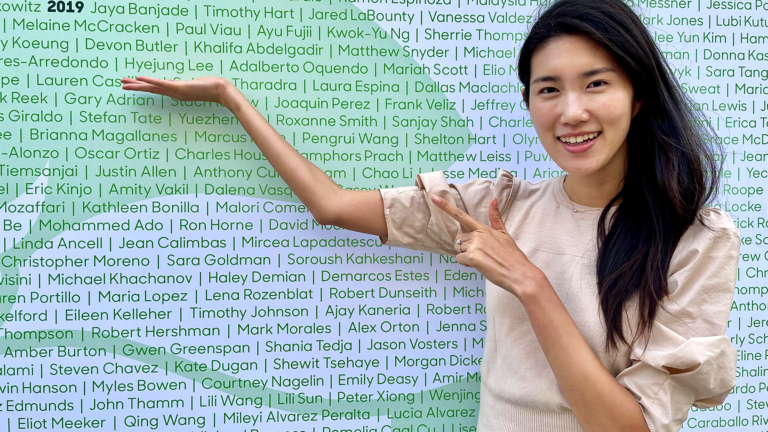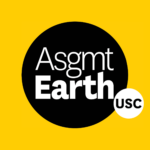
From wood fossils to plant-based burgers with an Earth sciences degree
Hyejung “Hazel” Lee spent her first 12 years in the concrete jungle.
Through fifth grade, she lived in a skyscraper in Seoul, South Korea, before her father’s job in the automotive industry necessitated a move to Fairfax County in Virginia.
The seeds of Lee’s interest in the natural world were planted during her three years living in Virginia, before she, her parents and older sister returned to South Korea, where Lee finished high school.
Now, after earning a PhD from the Department of Earth Sciences at the USC Dornsife College of Letters, Arts and Sciences, she’s an accomplished scientist in a field in which women remain underrepresented. Now, she works at, of all places, a food company, an unusual vocation for an Earth sciences graduate.
From Earth science to meat substitutes
While working on her PhD, which she earned in 2019, Lee used plant molecules to study climate in her specialty of organic geochemistry. After she graduated, she joined Beyond Meat in El-Segundo, California, a producer of plant-based ground beef, sausage, burgers, chicken, jerky and meatballs.
But Beyond Meat is no ordinary food company. Lee, as the company’s senior scientist and analytical team lead, is conducting experiments on some of the same state-of-the-art lab equipment she first used in her studies at USC Dornsife.
“Looking back, it was a natural transition,” says Lee of joining Beyond Meat after spending six years at USC Dornsife, mostly in the lab of Professor of Earth Science Sarah Feakins. Lee also gained invaluable lab skills with Travis Williams, professor of chemistry.
The resources and faculty expertise in the two departments seemed to fit her research efforts seamlessly, says Lee, the recipient, for two years, of a Provost Fellowship — the highest attainable for USC doctoral students.
Ancient clues to past climates
Before she was a Trojan, Lee attended the University of Pennsylvania, where she earned her undergraduate degree in environmental science.
As a sophomore there, she spent a summer in Puerto Rico studying how storms impact the global carbon cycle — the flow of carbon through land, water and air. She learned about the importance of plants and organic matter and how they affect climate over time.
“I got more and more interested in hands-on research and climate change, so I decided to go to graduate school,” she says.
Lee researched several universities and became intrigued with the work of Feakins, herself a successful scholar in a STEM field. Feakins’ research included using biomarkers and isotopes — tiny clues left behind by ancient plants — to examine precipitation levels and vegetative changes on a large scale.
“By looking at climate changing events in the past,” Lee explains, “you can gain insights into what may happen in future climate events.”
Lee recalls that Feakins’ lab had the newest equipment, including the isotope ratio mass spectrometry instruments, which are used to measure the mass-to-charge ratio of ions.
Lee was first author on four papers as a graduate student. Her first published study demonstrated her innovative aptitude. Using different varieties of a genetically modified plant species, she analyzed how differences in the density of tiny pores in the plant affect how the plant takes up different chemical isotopes — knowledge that helps scientists understand Earth’s past climates.
Next, she optimized several methods, or “recipes,” to analyze fossil plant remains, publishing two more papers and further aiding the study of past climates.
Having perfected this new way to analyze woody compounds, she got an exciting opportunity: applying the new method to understand the climatic significance of newly discovered remains of ancient forests deep in the Bay of Bengal. (The discovery of these 19-million-year-old wood chips made Newsweek and other national publications in 2019.)
Fearlessness delivers new “recipe book”
Feakins says Lee came to USC Dornsife with a strong quantitative background. “She was a quick learner in the lab and had this nice fearlessness about her.”
Such fearlessness helped Lee explore new methods of experimentation, Feakins adds.
“Basically, what we do in the lab is like cooking, we follow tried and tested recipes and apply them to new questions,” Feakins explains. “Hyejung’s thesis was different; we moved from wax to wood and needed a completely different recipe book. Her meticulous experimental work set up the approaches for our lab and proved what works and what doesn’t. Having gotten the recipe right, she then tackled a major piece of work about the long history of wood burial offshore.
“Hyejung really had to try things and figure out whether the samples would yield the same results if we cooked them for longer or at different temperatures, or changed the amount of what we were reacting. And it helped us detemine how consistent the results could be.”
Feakins says Lee’s calm demeanor was useful in dealing with all the issues that come up when testing out these new recipes.
A joy of figuring stuff out
At Beyond Meat, Lee established and oversees five lab spaces including eight mass spectrometers and other instruments used for nutritional analyses, microscopy, rheology (the study of the flow of matter), and the like. She conducts nutritional, flavor, texture and other analytical assays.
“At first I was afraid I had to become a vegetarian when I started working here,” she says with a laugh. (For the record, she’s a flexitarian.)
Lee loves the experimental nature of her job.
“The core skill I learned at USC Dornsife of developing new methods is useful at Beyond Meat because we’re doing something no one has done before,” she says. “We’re sort of starting from scratch.”
At work, Lee will do something as straightforward as determining the sodium content in Beyond Meat’s products or as complex as trying to figure out what makes beef taste and smell like beef and experimenting with plant ingredients to match the chemical profile as close as possible to animal references.
“I really like my job,” she says. “In many ways, I look at it as a once-in-a-lifetime job or project. I like working in somewhat new fields where everything is not figured out yet.”
She also loves Beyond Meat’s mission to create food products that significantly use less water, land and energy to make than products with real meat.
Recipe for success
Married to a strategy and operations specialist when she was nearing the completion of her PhD at USC Dornsife, Lee remains in Los Angeles while the rest of her family has returned to Seoul.
Outside of work, she’s into health and beauty trends, such as new ingredients in Korean skincare products. Recently, she’s been doing a lot of reading about longevity and reversing the signs of aging.
Lee’s also trying to cook more.
“Food is almost like chemistry,” she says, smiling. “You start with a recipe and experiment.”
